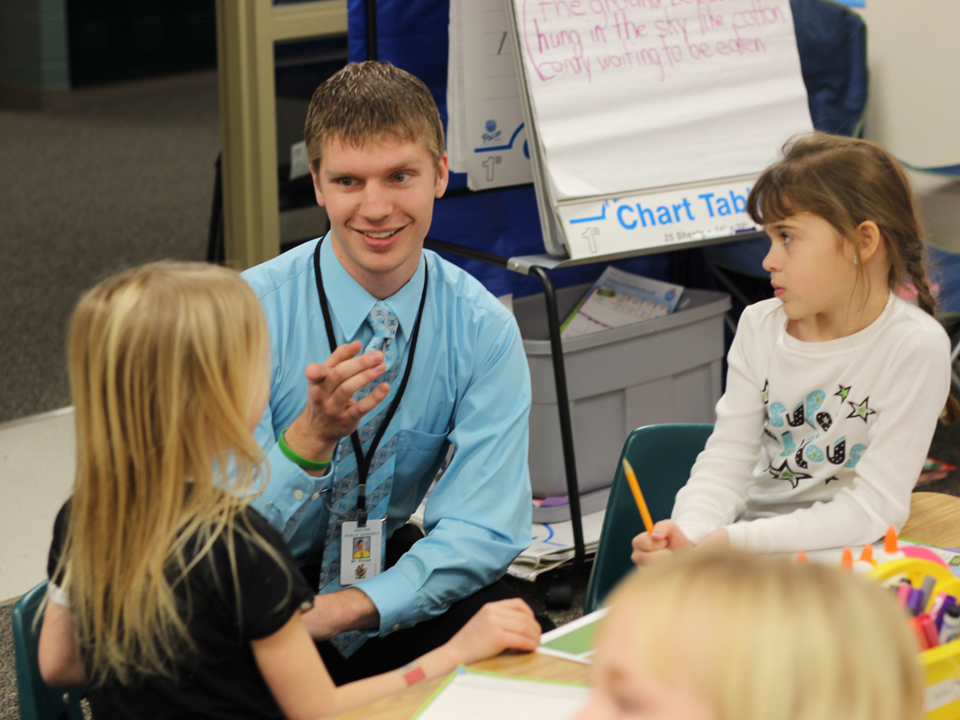
Gretna elementary and Primarily Math Cohort 4 ESU teacher Andrew Boone is coaching teachers in Bennington as part of a project with Bennington, UNO, and ESU 3. He also recently was part of a major presentation to the Gretna board of education regarding Primarily Math. Finally, Boone is working on the school improvement team in his building, Thomas Elementary.
Q: Tell us more about your work coaching teachers in Bennington as part of the project with UNO and ESU 3.
A: Through the project, I have had an opportunity to work with four other teachers in second, third, and fourth grades. During the project, we have focused on perseverance in problem solving as well as using models and representations in problem solving. When looking at perseverance in problem solving, we had the chance to observe two other Primarily Math teachers: Jessica Dickes and Carter Pratt. After the observations, we had a chance to debrief and reflect on how students persevered in problem solving as well as how the format of the lesson and questioning contributed to it. We have also been doing online discussions and have set up a resource board to share ideas and resources online.
Q: How did you get started in coaching? What was the most challenging aspect of becoming a coach? What is the most rewarding?
A: After Primarily Math, I was fortunate enough to have been asked by my curriculum director, Dr. Anderson, to participate as a coach in the Collaborative Math Project. The most challenging aspect of coaching is discovering my role in the process of improving mathematics. I have found that "colleague" rather than "coach" fits my role as I work with other teachers. My job is not to teach my colleagues but to enjoy a collaborative journey in an effort to improve instruction for our children. The most rewarding aspect of being a coach is the opportunity to collaborate. In addition, I get to see the multitude of ways teachers approach math instruction in an effort to connect math with children.
Q: What do you do as a member of your school's improvement team? We also heard that you recently were part of a major presentation to the board of education regarding Primarily Math. Tell us more about that experience.
A: As a member of the school’s improvement team, I get to work with four other colleagues to create professional development and monitor our efforts to meet our school goals. We have done professional development on Number Talks and problem solving.
I was honored to be a part of the presentation to the Gretna Public Schools Board of Education. I had the opportunity to have former students join me in a presentation on Number Talks. Students presented a multitude of strategies that demonstrated how we "talk" math in the classroom.
Q: What is a typical day for you? Are you in the classroom most of the day?
A: A typical day for me resides in my first grade classroom. I have taken a few half days for coaching this year.
Q: What are some things you learned through Primarily Math that have helped you develop as a teacher?
A: A few out of many ideas that I took away from Primarily Math were the importance of reflection, content understanding, and discussion in mathematics. Intentionally reflecting on lessons has allowed me to prepare and plan in a better fashion for future lessons. Reflection on student understanding has also been important as it guides my questioning of students and my future decisions that I will make to better connect children to the world of math. As students discuss ideas and justify their thoughts, content knowledge has helped me strategically question students to press for further reasoning and understanding.
Q: Do you remember any of your favorite teachers? How did they inspire you?
A: My high school math teacher, Mrs. Bonestroo, was a definite favorite. She opened the world of mathematics to me. Not only was she an excellent teacher with how she taught mathematics, but she also cared for her students in a way that demonstrated her commitment to us. She showed up early to school, stayed late, and always opened her room to students during study halls. Most importantly, she pressed me to become my best as a mathematician and learner.
Q: What do you like to work on outside of teaching?
A: Outside of teaching, I enjoy spending time with my wife, following the Omaha Storm Chasers during the summer, and following college football in the fall. I also enjoy running, writing, and reading.
Q: What is your favorite thing about Nebraska?
A: Since I was born in Minnesota and lived in Iowa most of my life, I am a Midwesterner at heart. Nebraska has truly become home for my wife and me in the past four years. We have truly discovered that "Nebraska Nice" is not a lie.